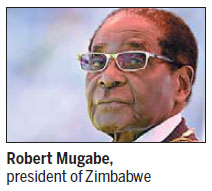Mugabe turns 90, still going strong
"I do not know how I have come to live this long," Zimbabwean President Robert Mugabe said a month ahead of his 90th birthday, which he celebrated on Friday.
Africa's oldest leader, he has outlived most of his younger siblings and most of his political foes. "It is all God's will," he said at the burial of his younger sister Bridget, who died aged 78.
Mugabe once quipped he would rule his country until he turned 100.
After winning a new five-year term last year, after more than three decades in power, he is not far from reaching that goal. The country's new constitution could see the man who first came into office as prime minister at age 56, serve as president until he is 99.
Mugabe swept to power in 1980 as an independence hero in the fight against white minority rule, bringing democracy to millions of black Zimbabweans, and was widely credited with health and education reforms.
He was also lauded for forging reconciliation between blacks and whites at independence - having offered some key ministerial posts to moderate white politicians.
More praise was showered upon him for allowing Ian Smith, the white supremacist Rhodesian ruler who had jailed him for a decade, to stay on in Zimbabwe serving as a lawmaker.
Born on Feb 21, 1924, at Kutama Mission, northwest of the capital Harare, Mugabe was raised in a Catholic family and was described as a loner and a studious child.
After his father walked out on Mugabe's mother and siblings when he was 10, Mugabe concentrated harder on his studies, and qualified as a schoolteacher at the age of 17.
An intellectual, he enrolled at Fort Hare University in South Africa, meeting many of southern Africa's future black nationalist leaders.
As a member of various nationalist parties that were banned by the white-minority government, Mugabe was detained in 1964 and spent the next 10 years in prison camps or jail. He used his incarceration to gain three degrees through correspondence courses, but the years in prison left their mark.
His 4-year-old son by his first wife, Sarah Francesca Hayfron, died while he was behind bars, but Rhodesian leader Smith would not allow him leave to attend the funeral.
On release from jail in 1974, he became leader of the ZANU party and left for neighboring Mozambique from where his banned group staged a guerrilla war on white minority-ruled Rhodesia.
Economic sanctions and war forced Smith to negotiate, after which ZANU came to power in the 1980 election.
Faced with angry war veterans, in 2000 he launched controversial land reforms, driving out white farmers and seizing their land in often violent rampages by his supporters.

Despite opposition to his rule, Mugabe retains the support of a significant proportion of Zimbabweans, who cherish his image as a freedom fighter.
Following the death of his first wife, he married his personal secretary. They have two sons and a daughter.
In recent years, Mugabe - one of the world's easily recognizable leaders with his philtrum-only moustache and thick-rimmed spectacles - often embraced his new role as the antagonist of the West.
He uses blistering rhetoric to blame Zimbabwe's economic problems on Western sanctions.
"If people say you are a dictator ... you know they are saying this merely to tarnish and demean your status, then you don't pay much attention," he said in a 2013 documentary.
He has told his critics to "go hang" and has vowed to forge ahead with his drive to empower blacks by forcing foreign-owned companies to cede their majority shares to locals.
Even as he turns 90, as he enters his 34th year in power, and his health is increasingly questioned, there is no hint of a succession plan in his party.
"The 89 years don't mean anything," said the self-confident Mugabe shortly before last year's election.
"They haven't changed me, have they? They haven't withered me. They haven't made me senile yet, no. I still have ideas, ideas that need to be accepted by my people."
(China Daily 02/22/2014 page6)














